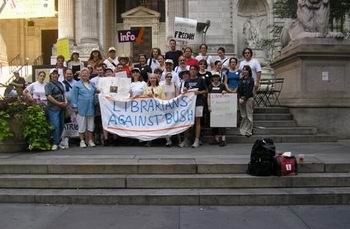
by Miguel Ramos, 2nd yr dMLIS student
I arrived in New York City on Aug 27, 2004, two days before the Republican National Convention (RNC) was scheduled to begin, and one day before the United For Peace and Justice (UFPJ) protest march. Though I was there to take part in the UFPJ march, I wasn’t there just as a protestor. I was also working with Radical Reference, a service provided by over 150 volunteer library workers from all over the United States. Our main goal was to assist demonstrators and activists at the convergence surrounding the Republican National Convention and to help with rumor control. My job was to provide street reference services to protestors, passersby and anyone else with a question that I could answer.
During the week that I was in NY I traveled all over the city, mostly by subway, sometimes by bus, attending various protest events such as planned civil disobedience activities at Times Square, the reading of the names of dead American soldiers and Iraqi civilians at a church, and many diverse gatherings and demonstrations throughout the city. I was always there as an information source, walking among the crowds of onlookers, participants and police, my ready reference binder in one hand, my Radical Reference hat on, a hand-made sticker on my shirt that read “You: Question. Me: Answer”.
It was hot and muggy, and my feet and back were always sore, and I faced a long ride back to Brooklyn at the end of every day when I was done, but it was also extremely rewarding and satisfying to be taking part in such an important social protest action and to be involved in the largest demonstration at a political convention in the history of the U.S. But my dual role as a protestor/activist and as an information source was unique.
People often ask me, “What kind of questions did you answer?” and “How did you answer them?” The questions that I answered had mostly to do with when specific RNC or protest events were scheduled to occur. These questions were, for the most part, easy to answer; the timetables and locations were all right there in my binder, as well as information about delegate’s hotels, corporate war profiteers, arrest advice and rights, restroom locations, and subway schedules. If I ever had a question that I couldn’t answer from the binder I could call a home support librarian.
Home support librarians make up the backbone of Radical Reference’s service. While street reference people are the eyes and mouths, it’s the home support that helps keep us informed. Scheduled almost around the clock and spread out around the country, a librarian or library worker was always a phone call away. If there was a question we couldn’t answer, it was a good bet that someone on the other end of the line would be able to.
Another unique tool that Radical Reference and many other protestors used was TxtMob, a service that allowed networks of activists to share real time text messages via their cell phones. In this way we were able to stay informed of any breaking news or events happening around the city, such as mass arrests or street closures. This tool was very effective both for rumor control and for basic information sharing.
Only one Radical Reference librarian was arrested during the week of protests, and his arrest was typical of the aggressive tactics that the police were using to round up large groups of people, many of whom were trying to leave a demonstration or who were just passing by. I myself was almost arrested three times in one 30-minute stretch in front of the NY Public Library; only by finding a quick exit from the encircling police nets was I able to stay on the street. Many others were not so lucky.
If I have any critiques of my experience doing street reference in NY, they are fairly minor and have to do with publicity and visibility. While everyone I met in NY was enthusiastic and excited by the idea of librarians on the street answering questions, not very many people knew we were out there. It’s hard to stand out in a crowd of thousands; perhaps bright yellow shirts with a black question mark on the back and front and more pre-event publicity would help street librarians be recognized and used more. We offer a valuable, needed service that protestors and activists can use – if anything, I feel like I could have done more.
Radical Reference is now an active website where anyone can post a question and have it answered by volunteer librarians from around the country. Though aimed at the activist community, we do not turn away more general types of questions. The Web site also serves as a fact-checking tool for the Independent Media Center. There is a one-hour workshop prepared and available to independent media journalists on fact checking and evaluating sources for accuracy, authority, coverage, currency, and objectivity.
Being in NY for the first time, under these conditions, and with this volunteer objective was a unique experience for me. I was happy to be there and excited to be representing librarians. We can really make a difference in situations where accurate, timely information can help shape our future. If anything, this experienced confirmed for me that my decision to be a librarian was the right one.
Radical Reference’s mission statement: Radical Reference is a collective of volunteer library workers who believe in social justice and equality. We support activist communities, progressive organizations, and independent journalists by providing professional research support, education and access to information. We work in a collaborative virtual setting and are dedicated to information activism to foster a more egalitarian society.
Note: my trip to NY was totally funded by donations from generous friends and colleagues. I wish to give them a big thanks. !Muchas Gracias!
